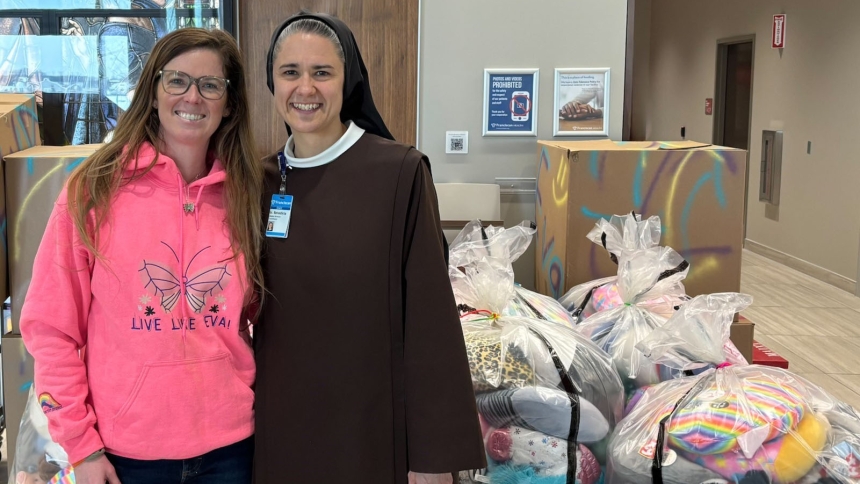
As published in the Northwest Indiana Catholic on April 14, 2019
Servant of God Catherine de Hueck Doherty was born in Russia, escaped the terrors of the Communist Revolution, settled in Canada and founded Madonna House, a version of the Catholic Worker houses, which welcomed the homeless, fed the hungry, served the poor and gave Catholics the opportunity to live in radical Christian community while acting out the charity and call of the Gospel.
I read the following quote from her writings, republished in the Magnificat magazine. I find it aptly inspiring as we enter into Holy Week.
“Every day of this holy season of Lent cries out God’s love to us, and for us. Are we going to begin to cry out our love back to him? Or are we going to hem ourselves into a sort of deadly prison, by deadly words - deadly words so short and tragic: ‘Yes, but; Yes, if; Yes, maybe; Not now, Lord, a little later.’ Is it possible that we can do that after we have traveled this holy journey, especially the last mile of his public life and passion?
Let us have a firm resolution to do just one thing: abolish the walls of our self-centeredness and selfishness. He resurrects - all this is leading to resurrection - but do we resurrect? Christ says, ‘Do you love me?’ and we do not answer directly, like Saint Peter did: “Yes, I love you, Lord.’ We say, ‘Maybe; perhaps I will start loving you a little later.’ He asks us, ‘Are you going to follow me?’ ‘Maybe, perhaps a little later.’
This is the season when we hear the nails being put into his hands because he loved us. He did not say, ‘Maybe, perhaps.’ He just said, ‘I love you, and the proof is that I am dying for you.” That is all.”
We have made this Lenten journey in prayer, fasting and almsgiving, once again arriving before the immensity of the Paschal Mystery - Jesus’ Passion, death and resurrection, this holiest of all weeks. We enter into the vastness of Christ’s heart, as he experiences the welcoming hosannas of the crowd on Palm Sunday, kneels in the humble service of the foot washing, hands over his sacramental presence for all time in the ineffable gift of the Eucharist and surrenders his life into the hands of the Father in the pathos of the crucifixion.
As the Servant of God Catherine reminds us in her reflection above, God’s love for us is total, immediate, sacrificial and salvific. In Christ’s stance towards us, no iota of hesitation, conditions or limitation comes between us and the Lord. In the strange, terrible, surprising and saving events we liturgically celebrate and devotedly ponder this week, the extreme mercy of God knows no boundaries. How loved and precious we must be to the Lord if he willingly, lovingly and obediently did all of this in order to redeem our souls and win forgiveness and eternal life for us.
This extraordinary gift of life and mercy offered to us through the Paschal Mystery of Jesus Christ invites, even demands a response. When we spiritually come to our senses and realize the enormity of love that the Lord wants to give us, like the Prodigal Son, we get up and return to the Father’s house with joy.
Most of the saints could not ponder a crucifix without crying, so deeply moved were they, not only by Jesus’ suffering, but also by his extravagant love for us. Our life of discipleship, faith and service becomes our generous response to the generosity of God.
Every Holy Week, I contemplate Jesus’ vulnerability - wildly acclaimed in the middle of a cheering multitude, humbly on his knees washing dirty feet, pouring out his total self in the gift of the Eucharist, condemned, tortured and crucified in a very public place where anyone could hurt, insult and ridicule him.
What kind of God allows himself to be placed in such a horrible situation? Who can comprehend a love that embraces a coward, a traitor and a thief in a divine embrace even while being destroyed by unruly hatred? The more we enter into the narrative of this sacred time, the more we will encounter Holy Week as shocking, unnerving, humbling, moving and ultimately saving.
We should not normalize the events of this week. These last moments of Jesus’ earthly life invite us into an entirely different way of understanding God. This narrative is a strange and beautiful landscape which leads us into the very heart of God.
I offer here some activities that I usually do during Holy Week to consecrate these very special days. Hold a crucifix and contemplate it. View and ponder the infinite compassion of the Lord in his Passion and death. Read one of the Passion narratives in the Gospel and pray over it. What details of the story particularly strike or move you?
Attend the Chrism Mass at Holy Angels Cathedral on Holy Thursday, when we bless all the sacred oils to be used in the sacraments throughout the diocese for the next year. Pray for all the people who will spiritually benefit from these healing oils. Participate in all the liturgies of the Triduum: Holy Thursday, Good Friday and the Easter Vigil. They are utterly unique and hauntingly beautiful in their simplicity.
Watch one of the Easter films. I especially like Ben-Hur. Decorate your house for Easter with flowers or an image of the Risen Christ complete with a little altar. Use that sacred space for prayer during the Easter season.
Around the dinner table on Easter Sunday, invite your guests to share how this Lent was transformative or how they have met the risen Christ. Make this Holy Week a time set apart with its own rhythm of prayer and passion.
+ Donald J. Hying



